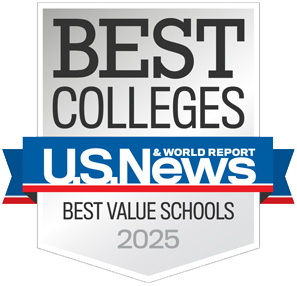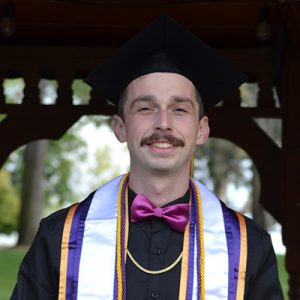Mathematics for Teaching
Become the math teacher your future students need.
There’s a difference between learning a subject and learning to teach it. You’ll want to do both to be the kind of teacher that inspires their students to love math.
Advance your mathematical knowledge
The core requirements for this major are the same as our traditional bachelor’s degree in mathematics. You’ll build a foundation in mathematical theory and explore its branches, from geometry to calculus. You’ll solve complex problems by creating simulations and models, and you’ll study related fields like computer programming and physics.
Prepare to become a math teacher
By choosing this major, you’ll be well-prepared for the teaching credential program of your choice. As a specialized major for those interested in teaching math at the middle school and high school levels (grades 6-12), your courses will meet the requirements to enter a credential program in California after graduation.
You can generally earn your teaching credential within one year, and our teaching credential program also includes the option to earn your master’s degree with three additional courses.
TEAMS Scholarship
This major integrates well with the TEAMS (Teacher Experiences Advancing Mathematics and the Sciences) Program. TEAMS is a selective opportunity for those interested in teaching secondary-level math or science. It provides an undergraduate scholarship for your senior year and a stipend for your credential program. All mathematics for teaching students should apply early in their junior year at Cal Lutheran.
At a Glance

Degree Type
Bachelor of Science
Department
School/College
College of Arts and Sciences
Next Steps
Interested in this major? Here's what you can do next:
With challenging and relevant courses, outstanding faculty, small class sizes, and an emphasis on hands-on learning, the mathematics for teaching program will position you to succeed in your chosen career.
Degree requirements
Find out what it takes to earn a degree in mathematics for teaching and explore the courses.
Highlighted Courses
Get familiar with some of the courses you might take in this major.
CSC 210: Introduction to Computer Programming
First-semester computer programming course. This course introduces the principles of computer science, problem-solving methods and algorithm development using a high-level language. This is a programming class primarily for computer science, computer information systems, mathematics, and science majors.
Read descriptionIES 362: Career Decisions in Education
This course serves as an introduction to the teaching profession. Students who are considering a career in the field of education will become acquainted with the many facets of the teaching profession. Fieldwork in an educational setting is required.
Read descriptionMATH 241: Discrete Mathematics
Topics include set theory, number systems, the nature of proofs, recursion, algorithms, graph theory and problem solving. This course is required for computer science and computer information systems majors.
Read descriptionMATH 320: Elementary Mathematical Analysis
An introduction to mathematical analysis emphasizing conjecture and proof. Content includes elementary logic and quantifiers, manipulations with sets, relations and functions, properties of the real number system, supremums and infimums, sequences and limits of sequences, and the topology of the real line. The course will introduce students to the concepts and techniques of mathematical proof.
Read descriptionMATH 261: Calculus III
Calculus III extends the concepts of calculus to a multivariable perspective. Topics such as functions, derivatives, integrals and various coordinate systems are used to explore change modeled by two or more variables. Vector algebra and vector fields are introduced to study the motion of objects. Students will use a computer algebra system to engage with material in the course.
Read descriptionMATH 382: Number Theory
This course focuses on the properties of integers and the history of the discovery of these properties. Topics include fundamental theorems on divisibility, primes and congruences, as well as number-theoretical functions, Diophantine equations, quadratic reciprocity and Fermat's Last Theorem. This course will introduce students to the concepts and techniques of mathematical proof.
Read descriptionView all courses in Mathematics
Recommended Minors
Want to add even more value to your degree? Consider one of these minors to gain a unique combination of skills and perspectives.
We offer hands-on opportunities that give you the freedom to explore your passion through real-world work and prepare for a fulfilling career.
-
Internships
By completing a paid internship at our campus Math Center, you’ll build confidence in your teaching while helping fellow students master mathematical concepts and problem-solving.
-
Portfolio Building Opportunities
Your portfolio will synthesize and summarize your experiences as an undergraduate student. It will include work samples from your courses, a reflection on your tutoring experience, and writings on topics related to math and education. Before graduation, you’ll present your portfolio to faculty and give them a teaching demo, which will be great preparation for your credential program.
Students who graduate from our program often go on to obtain a teaching credential from our Graduate School of Education, which enables them to teach in public schools in California. During their application for credential programs, the math for teaching major helps to distinguish them from other candidates — and it signals to future hiring managers that they are committed to the field. Without a credential, career options include teaching in private schools, performing educational work in service-learning organizations, and pursuing other specialties related to mathematics.
Potential Careers
Secondary School Teachers, Except Special and Career/Technical Education
Teach one or more subjects to students at the secondary school level.
Read descriptionMiddle School Teachers, Except Special and Career/Technical Education
Teach one or more subjects to students at the middle, intermediate, or junior high school level.
Read descriptionMathematical Science Teachers, Postsecondary
Teach courses pertaining to mathematical concepts, statistics, and actuarial science and to the application of original and standardized mathematical techniques in solving specific problems and situations. Includes both teachers primarily engaged in teaching and those who do a combination of teaching and research.
Read descriptionSurvey Researchers
Plan, develop, or conduct surveys. May analyze and interpret the meaning of survey data, determine survey objectives, or suggest or test question wording. Includes social scientists who primarily design questionnaires or supervise survey teams.
Read descriptionMathematicians
Conduct research in fundamental mathematics or in application of mathematical techniques to science, management, and other fields. Solve problems in various fields using mathematical methods.
Read descriptionMarket Research Analysts and Marketing Specialists
Research conditions in local, regional, national, or online markets. Gather information to determine potential sales of a product or service, or plan a marketing or advertising campaign. May gather information on competitors, prices, sales, and methods of marketing and distribution. May employ search marketing tactics, analyze web metrics, and develop recommendations to increase search engine ranking and visibility to target markets.
Read description
With this program, I obtained an internship in the Math Center and built a portfolio of work samples of different branches of mathematics. Other than making connections with mathematics topics I learned in high school, the single subject mathematics program allowed me to connect with my mathematics professors while participating in research. This program allowed me to think critically on topics which allowed me to understand and then communicate to others about what I have learned and develop skills needed for teaching and explaining mathematics.
Brycen Arnold '23
This page includes information from O*NET OnLine by the U.S. Department of Labor, Employment and Training Administration (USDOL/ETA). Used under the CC BY 4.0 license. Some occupations listed above may require a related graduate degree.
How We Prepare You for Success
We have 20,000+ employer contacts for jobs and internships, with over 200 listings posted each week.
Our excellent career counselors in the Career Services center will get in touch with you during your very first term on campus. They offer over 50 workshops each year on resume writing, interviewing, salary negotiations, applying to graduate schools, and other critical skills to help you begin your career successfully.
After you graduate from Cal Lutheran, you receive free access to Career Services for life, as a valued member of our alumni family.
of Cal Lutheran graduates find a job or enroll in graduate school within nine months
We work with students and families to make sure everyone who is admitted to Cal Lutheran can afford it.
Tuition & Fees
You and your family might have questions about how you’ll cover the costs of college. We can tell you this — it costs less than you think.
Scholarships & Grants
We offer a range of awards based on academic merit and financial need. This is money that does not need to be repaid.
Net Price Calculator
Take a few minutes to use our calculator and get yourself a personalized estimate of your costs and financial aid.
Let us know and we'll send you information about our academics, campus life, the admission process, and more!
Ready to apply?
We’re now accepting applications for Fall 2026!
Level Up Your College Search
Check out our college success guides to help you navigate the search process.

How to Choose a College Major
Your major will be a significant part of your academic experience. How do you pick the right one?

5 Tips for Applying to College
Learn how to look good when applying to colleges, with personal tips to stand out from Cal Lutheran admission counselors.

How to Afford College
Read this guide to minimize costs as you save for college during high school — learn all about scholarships, financial aid, FAFSA, and more!

5 Key Advantages of a Liberal Arts Education
Are the liberal arts still worth studying in today's world? If you want a future-proof college education — absolutely.

How to Get Recruited for College Athletics
Check out our tips to connect with coaches, navigate campus visits, and move forward with confidence.

Private vs. Public Universities
The differences between each — and how to choose the school with your dream college experience.
